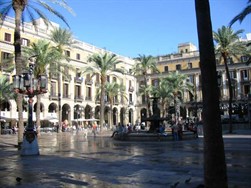Barcelona
 In the Early Modern period, Barcelona was an important center of textile production and a major trading port of the Mediterranean. Following the dynastic union between the Aragonese king Ferdinand the Catholic (1452-1516) and Isabella of Castile (1451-1504), starting in the early sixteenth century, Catalonia became part of the new Spanish monarchy. Barcelona jealously preserved its institutions of self-government against the will of Aragonese and then Spanish centralization until the revolt, in 1640, against the policies of Philip IV (1605-1665) and his minister-favourite, the Count-Duke of Olivares (1587-1645). The rioters attempted to secede from Spain, giving the title of Duke to Louis XIII of France (1601-1643). In 1652, the siege of Castilian troops forced the surrender of a city already weakened by the plague (1651-1654) which reduced the city to a third of its population. The Catalan capital revolted again in vain in 1704, during the War of the Spanish Succession (1701-1713), against the establishment of the Bourbon dynasty. Philip V (1683-1746) recaptured Barcelona and definitively suppressed its autonomy. (photo: Plaça Reial, Barcelona)
In the Early Modern period, Barcelona was an important center of textile production and a major trading port of the Mediterranean. Following the dynastic union between the Aragonese king Ferdinand the Catholic (1452-1516) and Isabella of Castile (1451-1504), starting in the early sixteenth century, Catalonia became part of the new Spanish monarchy. Barcelona jealously preserved its institutions of self-government against the will of Aragonese and then Spanish centralization until the revolt, in 1640, against the policies of Philip IV (1605-1665) and his minister-favourite, the Count-Duke of Olivares (1587-1645). The rioters attempted to secede from Spain, giving the title of Duke to Louis XIII of France (1601-1643). In 1652, the siege of Castilian troops forced the surrender of a city already weakened by the plague (1651-1654) which reduced the city to a third of its population. The Catalan capital revolted again in vain in 1704, during the War of the Spanish Succession (1701-1713), against the establishment of the Bourbon dynasty. Philip V (1683-1746) recaptured Barcelona and definitively suppressed its autonomy. (photo: Plaça Reial, Barcelona)
